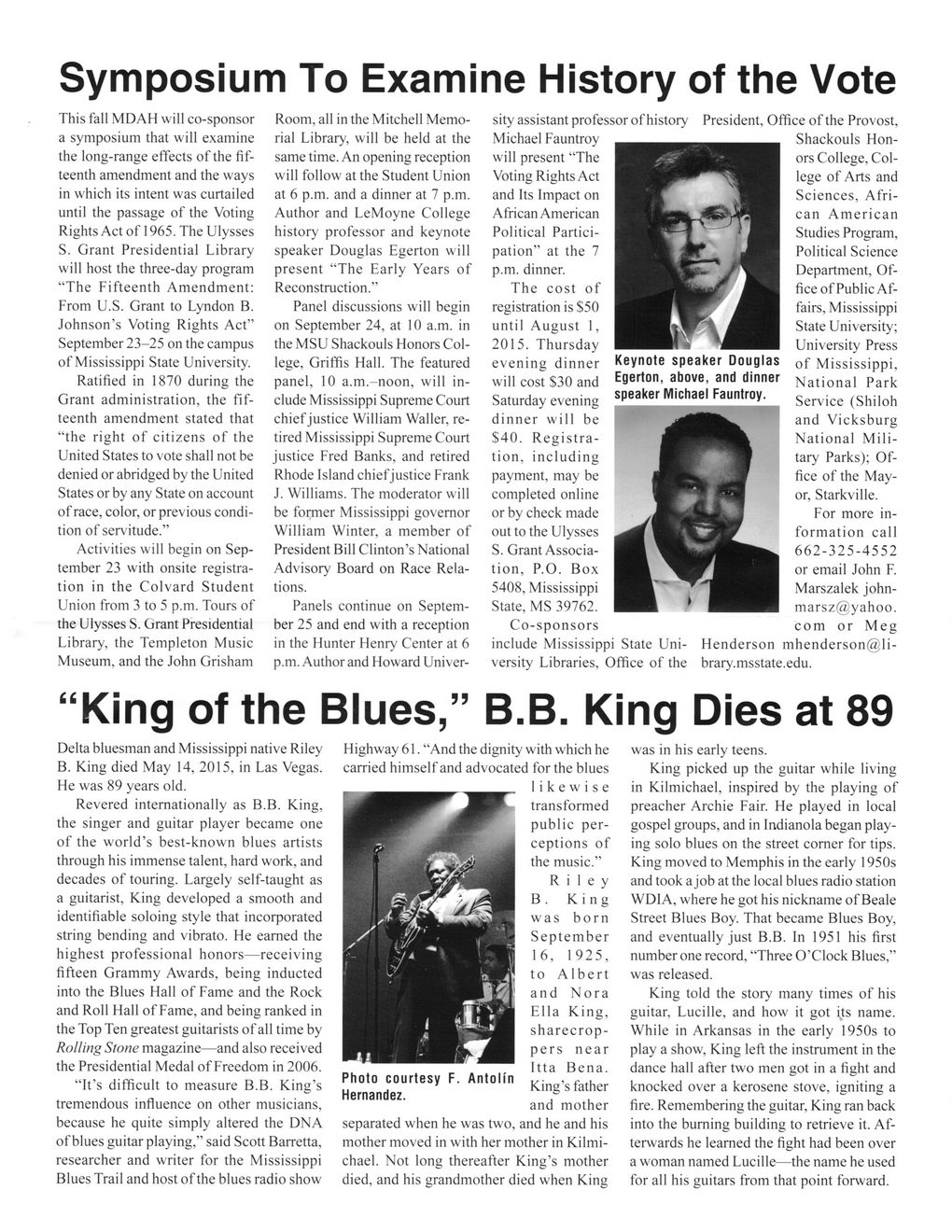This text was obtained via automated optical character recognition.
It has not been edited and may therefore contain several errors.
Symposium To Examine History of the Vote This fall MDAH will co-sponsor a symposium that will examine the long-range effects of the fifteenth amendment and the ways in which its intent was curtailed until the passage of the Voting Rights Act of 1965. The Ulysses S. Grant Presidential Library will host the three-day program “The Fifteenth Amendment: From U.S. Grant to Lyndon B. Johnson’s Voting Rights Act” September 23-25 on the campus of Mississippi State University. Ratified in 1870 during the Grant administration, the fifteenth amendment stated that “the right of citizens of the United States to vote shall not be denied or abridged by the United States or by any State on account of race, color, or previous condition of servitude.” Activities will begin on September 23 with onsite registration in the Colvard Student Union from 3 to 5 p.m. Tours of the Ulysses S. Grant Presidential Library, the Templeton Music Museum, and the John Grisham Room, all in the Mitchell Memorial Library, will be held at the same time. An opening reception will follow at the Student Union at 6 p.m. and a dinner at 7 p.m. Author and LeMoyne College history professor and keynote speaker Douglas Egerton will present “The Early Years of Reconstruction.” Panel discussions will begin on September 24, at 10 a.m. in the MSU Shackouls Honors College, Griffis Hall. The featured panel, 10 a.m.-noon, will include Mississippi Supreme Court chief justice William Waller, retired Mississippi Supreme Court justice Fred Banks, and retired Rhode Island chief justice Frank J. Williams. The moderator will be former Mississippi governor William Winter, a member of President Bill Clinton’s National Advisory Board on Race Relations. Panels continue on September 25 and end with a reception in the Hunter Henry Center at 6 p.m. Author and Howard Univer- sity assistant professor of history Michael Fauntroy will present “The Voting Rights Act and Its Impact on African American Political Participation” at the 7 p.m. dinner. The cost of registration is $50 until August 1, 2015. Thursday evening dinner will cost $30 and Saturday evening dinner will be $40. Registration, including payment, may be completed online or by check made out to the Ulysses S. Grant Association, P.O. Box 5408, Mississippi State, MS 39762. Co-sponsors include Mississippi State University Libraries, Office of the Keynote speaker Douglas Egerton, above, and dinner speaker Michael Fauntroy. President, Office of the Provost, Shackouls Honors College, College of Arts and Sciences, African American Studies Program, Political Science Department, Office of Public Affairs, Mississippi State University; University Press of Mississippi, National Park Service (Shiloh and Vicksburg National Military Parks); Office of the Mayor, Starkville. For more information call 662-325-4552 or email John F. Marszalek john-marsz@yahoo. com or Meg Henderson mhenderson@li-brary.msstate.edu. King of the Blues,” B.B. King Dies at 89 Delta bluesman and Mississippi native Riley B. King died May 14, 2015, in Las Vegas. He was 89 years old. Revered internationally as B.B. King, the singer and guitar player became one of the world’s best-known blues artists through his immense talent, hard work, and decades of touring. Largely self-taught as a guitarist, King developed a smooth and identifiable soloing style that incorporated string bending and vibrato. He earned the highest professional honors—receiving fifteen Grammy Awards, being inducted into the Blues Hall of Fame and the Rock and Roll Hall of Fame, and being ranked in the Top Ten greatest guitarists of all time by Rolling Stone magazine—and also received the Presidential Medal of Freedom in 2006. “It’s difficult to measure B.B. King’s tremendous influence on other musicians, because he quite simply altered the DNA of blues guitar playing,” said Scott Barretta, researcher and writer for the Mississippi Blues Trail and host of the blues radio show Highway 61. “And the dignity with which he carried himself and advocated for the blues likewise transformed public perceptions of the music.” Riley B. King was born September 16, 1925, to Albert and Nora Ella King, sharecroppers near Itta Bena. King’s father and mother separated when he was two, and he and his mother moved in with her mother in Kilmi-chael. Not long thereafter King’s mother died, and his grandmother died when King Photo courtesy Hernandez. F. Antolin was in his early teens. King picked up the guitar while living in Kilmichael, inspired by the playing of preacher Archie Fair. He played in local gospel groups, and in Indianola began playing solo blues on the street comer for tips. King moved to Memphis in the early 1950s and took ajob at the local blues radio station WD1A, where he got his nickname of Beale Street Blues Boy. That became Blues Boy, and eventually just B.B. In 1951 his first number one record, “Three O’Clock Blues,” was released. King told the story many times of his guitar, Lucille, and how it got its name. While in Arkansas in the early 1950s to play a show, King left the instrument in the dance hall after two men got in a fight and knocked over a kerosene stove, igniting a fire. Remembering the guitar, King ran back into the burning building to retrieve it. Afterwards he learned the fight had been over a woman named Lucille—the name he used for all his guitars from that point forward.

Mississippi History Newsletter 2015 Summer (5)